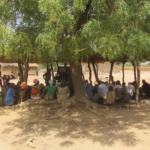


Farm Input Promotions Africa Ltd (FIPs)
Kenya
5/2020—5/2022
Millions of farm families in Kenya face hunger and poverty due to low agricultural productivity and high post-harvest losses. Challenges include: poor soil health; fall armyworm (FAW), a major pest that attacks maize and other crops; and grain storage losses. In its initial phase, the project worked with farmers on agroecology options to address these challenges. For soil health, micro-dosed lime improved crop performance within a single season, particularly on more acidic soils. For FAW, application of soil to the maize whorl, together with good scouting, led to reduced infestation without the use of pesticides. For grain storage, diatomaceous earth (DE) prevented pest infestation, maintained dry grain, and may reduce aflatoxin risk. However, gaps remain, including: validation of liming and aflatoxin results, adapting the options to different farmer contexts, and assessing who adopts these promising AEI options by context, including social and landscape differences.
The proposed project lead, Farmer Input Promotions-Africa (FIPS-Africa), a not-for-profit organization based in Kenya, works with more than 1,000 Village Based Advisors (VBAs) to try out technologies and share results with farmers. However, capacity to understand and address different farmer needs and contexts is currently limited. The farmer research network (FRN) approach offers a way that communities and project teams can work together to identify, test and share options to address some of their important agricultural challenges. The project aims to combine FRN principles with FIPS’ scale to develop soil health, combat FAW, and pursue post-harvest technology options for smallholder farmers in project areas of eastern and western Kenya.
The proposed project has twin aims:
1) To develop a scalable model, using FRN principles, to enable projects to better incorporate farmer priorities into the research agenda, and to facilitate farmer-researcher co-creation of technologies and promote networking of knowledge across farmer and research communities. Elements of the model may also be used to inform other FRN project partners as they seek to scale their work.
2) To offer smallholder farmers in Kenya adoptable agroecological options that address three pressing challenges: poor soil health, FAW, and losses during grain storage (including toxin accumulation).
The project will build on research initiated in Phase 1 to advance evidence on how AEI options can be effectively adapted and targeted to farmers likely to adopt them. The specific research question will be: What AEI options work where, to what extent, and for whom (4W)? The project will share evidence and learning with farmers within its direct sphere of influence and with the wider R&D community to support scaling of AEI options to address soil health, FAW, and grain storage challenges in different contexts.
Objectives:
Outcomes:
